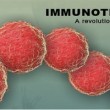The Immune System: The Power Within
In the search for cancer cures, it turns out that some of the most powerful answers have been inside us all along!
Most cancer treatments extract a high t oll from patients. Chemotherapy and radiation kill cancer cells but also ravage healthy ones. The often-toxic treatments are painful and carry many complications, many of which follow patients for their entire lives. Surgery carries a high risk, too—and it’s not an option for some cancers that have invaded extremely sensitive areas, such as the brain and the spine. Many therapies also carry a high rate of cancer recurrence.
oll from patients. Chemotherapy and radiation kill cancer cells but also ravage healthy ones. The often-toxic treatments are painful and carry many complications, many of which follow patients for their entire lives. Surgery carries a high risk, too—and it’s not an option for some cancers that have invaded extremely sensitive areas, such as the brain and the spine. Many therapies also carry a high rate of cancer recurrence.
By Ignacio Lobos
Immunotherapy has the potential to change cancer care for thousands of patients, to make it less toxic and less invasive, with a much higher rate of success than conventional treatments. That optimism has grown from a greater understanding of the immune system and many positive results at the Hutchinson Center.
The Center’s Program in Immunotherapy counts more than 30 researchers, including several world experts in their respective fields.
Appelbaum has become an internationally recognized leader in research that improves treatments for blood cancers
“Because of our historic interest in the immune system and our pioneering research that led to bone marrow transplantation, we have had a stronger focus on immunotherapy than any other cancer center anywhere, and we have populated our labs with leaders in the field,” Appelbaum said.
Training the immune cells to fight cancer

Please watch this great video about Immunotherapy
Described most simply, the immune system is a 24/7 sentinel that goes to work when a virus, fungus, parasite or bacterium enters the body. This sentinel is as good as the sum of its parts: an intricate network of multiple organs, cells and other molecules working together to recognize and destroy invaders.
“The body has a remarkable ability to see things that are not its own, not itself, and react against them,” Appelbaum said.
But on its own, the immune system doesn’t do a good job against cancer. Because every cancer cell was once a normal cell with a few mutations in its DNA, the immune system sometimes doesn’t recognize cancer cells as being different. Instead of killing them, it tolerates their presence.
“With the advances that we have seen and our understanding of the immune system in terms of what it sees, how it sees it, what it kills, how it kills it, how it maintains memory, what blocks it—in every one of these areas, we know so much more than we knew just a few years ago,” Appelbaum said.
More links on this subject:
Melanoma Stopped in Patient with 5 Billion Copies of Own Cell




Speak Your Mind